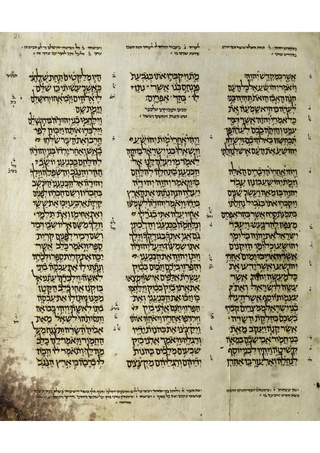Related Research Articles

Abarim is the Hebrew name used in the Bible for a mountain range "across the Jordan", understood as east of the Jordan Rift Valley, i.e. in Transjordan, to the east and south-east of the Dead Sea, extending from Mount Nebo — its highest point — in the north, perhaps to the Arabian desert in the south.
The name Abda means servant, or perhaps is an abbreviated form of servant of YHWH. There are two people by this name in the Hebrew Bible.
Ebez also rendered Abez, was a town in the allotment of the tribe of Issachar, at the north of the Jezreel Valley, or plain of Esdraelon. F. R. and C. R. Conder (1879), believed that it was probably the ruins of el-Beida, but William Robertson Smith (1899) expressed doubt about this identification. According to the 1915 International Standard Bible Encyclopedia (1915), the location is not known. It is mentioned only in Joshua 19:20, where various manuscripts of the Septuagint render it as Rebes, Aeme, or Aemis. It is mentioned on the façade of the Mortuary Temple of Ramesses III at Medinet Habu as Apijaa.

Achsah, was Caleb ben Yefune's only daughter. Her name comes from the word for "anklet", עכס (ekes).

Achshaph was a royal city of the Canaanites, in the north of Canaan. The name means "sorcery".
Adriel was a person mentioned in the Bible. Adriel was a nobleman in the ancient kingdom of Israel.
The Hivites were one group of descendants of Canaan, son of Ham, according to the Table of Nations in Genesis 10 (10:17). A variety of proposals have been made, but beyond the references in the Bible to Hivites in the land of Canaan, no consensus has been reached about their precise historical identity.
Aroer is a biblical town on the north bank of the River Arnon to the east of the Dead Sea, in present-day Jordan. The town was an ancient Moabite settlement, and is mentioned in the Bible.
According to the Torah, Gershon was the eldest of the sons of Levi, and the patriarchal founder of the Gershonites, one of the four main divisions among the Levites in biblical times. The Gershonites were charged with the care of the outer tabernacle including components such as the tent and its covering, screens, doors, and hangings. Biblical scholars regard the name as being essentially the same as "Gershom", which appears to mean "a sojourner there", and it is Gershom rather than Gershon who is sometimes listed in the Book of Chronicles as a founder of one of the principal Levite factions. The Torah names Gershon's sons as Libni and Shimei.
According to the Book of Joshua, Adonizedek was king of Jerusalem at the time of the Israelite invasion of Canaan. According to Cheyne and Black, the name originally meant "Ṣedeḳ is lord", but this would likely have been read later as meaning "lord of righteousness" or "my lord is righteousness".
Almon Diblathaimah was one of the places the Israelites stopped at during the Exodus. By the name "Almon Diblathaimah" it is referred to only in Numbers 33:46 and 47, in a list of stopping-points during the Exodus. It is usually considered the same place as Beth-diblathaim of Jeremiah 48:22, mentioned in the oracle against Moab.

Judges 1 is the first chapter of the Book of Judges, the seventh book of the Hebrew Bible or Old Testament, a sacred text in Judaism and Christianity. With the exception of the first verse, scholars have long recognised and studied the parallels between chapter 1 of Judges and chapters 13 to 19 in the preceding Book of Joshua. Both provide similar accounts of the purported conquest of Canaan by the ancient Israelites. Judges 1 and Joshua 15–19 present two accounts of a slow, gradual, and only partial conquest by individual Israelite tribes, marred by defeats, in stark contrast with the 10th and 11th chapters of the Book of Joshua, which portray a swift and complete victory of a united Israelite army under the command of Joshua.
Abinoam, from Kedesh-naphtali, was the father of Barak who defeated Jabin's army, led by Sisera. He is mentioned only in Judges 4:6, 4:12 and 5:12.
Kerioth is the name of two cities mentioned in the Hebrew Bible. The spelling Kirioth appears in the King James Version of Amos 2:2. The name means "cities," and is the plural of the Biblical Hebrew קריה.
- A town in the south of Judea. Judas Iscariot was probably a native, hence his name "Iscariot". It has been identified with the ruins of El Kureitein, about 10 miles south of Hebron.
- A city of Moab, called Kirioth.
Adami-nekeb according to the Revised Version, or Adami-hannekeb, is a place mentioned in the Hebrew Bible's Book of Joshua, as a passage on the frontier of Naphtali. It is mentioned only in Joshua 19:33.
References
- ↑ David Noel Freedman; Allen C. Myers (31 December 2000). Eerdmans Dictionary of the Bible. Amsterdam University Press. p. 1405. ISBN 978-90-5356-503-2.
- ↑ Serge Frolov (22 May 2013). Judges. Wm. B. Eerdmans Publishing. p. 138. ISBN 978-0-8028-2967-2.
- ↑ Ellicott, Charles John, ed. (1883). An Old Testament Commentary for English Readers: Deuteronomy, Joshua, Judges, Ruth, Samuel. Cassell, Petter, Galpin & Co. p. 192.
- 1 2 Thomas Kelly Cheyne; John Sutherland Black (1903). Encyclopædia biblica: a critical dictionary of the literary, political and religious history, the archæology, geography, and natural history of the Bible. Volume 4, Q-Z. A. and C. Black. p. 5369.
- ↑ For the Septuagint's reading (Besemiin or Besenanim), see the New English Translation of the Septuagint at Joshua (Iesous) 19:33 .
![]() This article incorporates text from a publication now in the public domain : Easton, Matthew George (1897). "Zaanaim". Easton's Bible Dictionary (New and revised ed.). T. Nelson and Sons.
This article incorporates text from a publication now in the public domain : Easton, Matthew George (1897). "Zaanaim". Easton's Bible Dictionary (New and revised ed.). T. Nelson and Sons.